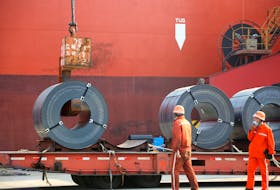Shannon Arnold says it’s almost a case of “I told you so.” Arnold, the marine policy co-ordinator with the Ecology Action Centre, said concerns for the province’s coastline and coastal waters remain even after BP Canada was given clearance last week to restart drilling operations following the spill of thousands of litres of drilling mud.
“For us . . . there was a lot of rhetoric and there is always a lot of talk about how safe it is and what the risk is. And yet, it seems that in many of these operations there are potentially small things that may go unnoticed that fall underneath the required threshold for what needs to be reported,” she said.
“This is just at the initial stages of their work there, and while it’s not a spill of oil, it is a spill of something.”
“It doesn’t give Nova Scotians confidence, I would say, moving forward that this is going to be low-risk to our marine environment.”
The June incident saw 136 cubic metres of synthetic drilling mud— a heavy, dense fluid used to lubricate the drill pipe and regulate reservoir pressure — leak from the West Aquarius drilling unit 330 km off Nova Scotia’s coast.
The initial investigation said the spill occurred in piping about 30 metres below sea level.
The Canada-Nova Scotia Offshore Petroleum Board said last week that the leak was caused by a loose connection in the mud booster line. It said
BP took measures to prevent another spill, including replacing a section of the mud booster line and installing a pressure system alarm. Arnold said if the pressure system alarm was available, it should have been in place to begin with. The impact of the spill, just two months after drilling was approved at the site, is still being evaluated.
“There are still a lot of questions,” Arnold said.
She said the incident makes concerns about a potential oil spill more real in an area where there is a substantial fishing industry.
“Any kind of oil spill out there is going to be enormously difficult to clean up,” she said. “We’re right along the continental shelf, we’re right along the Gulf stream, it’s extremely bio-diverse out there.”
Mark Mallory, the Canada Research Chair in Coastal Wetland Ecosystems at Acadia University, said that in Nova Scotia, and eastern North America in general, one of the greatest concerns about a spill is the time of year.
He said a spill during seabird breeding season can have a larger impact, as birds are packed in at a colony.
“If a spill occurs that moves into that feeding halo around the colony, that can be a real problem for birds that either have to land on the water or land and dive through the water,” he said.
“If they don’t cause a toxicity problem for the bird ingesting them, they can get into the feathers and ruin the insulation and the buoyancy effects of the feathers if there is some kind of oily type of substance.”
He said there are hundreds of thousands, if not millions, of seabirds that winter along the coast of Nova Scotia through Newfoundland and into the Labrador Sea. “Most of these birds are living their entire winter out in the ocean. At that time they are often more compromised for food sources,” Mallory said.
He said while photos of oilcoated birds from other spills around the world are the most dramatic, he suspects that a lot of damage also happens to birds that aren’t encased, but just have enough oil on their feathers to expose them to the cold because they can’t regulate their temperature.
If oil or related substances move ashore to coastal habitats, he said, it can remain for a long time and affect the habitats, shore birds, fish nursery areas and invertebrates.
“That can change all kinds of things: physically coating environments, or altering, perhaps oxygen and other water chemistry properties that are required for those organisms to live.”
With files from The Canadian Press








